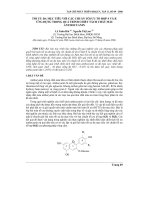Tài liệu The Portable Ethicist for Mental Health Professionals A Complete Guide to Responsible Practice Second Edition pptx
Bạn đang xem bản rút gọn của tài liệu. Xem và tải ngay bản đầy đủ của tài liệu tại đây (4.67 MB, 577 trang )
The Portable Ethicist for
Mental Health Professionals
A Complete Guide to
Responsible Practice
Second Edition
With HIPAA Update
Thomas L. Hartsell Jr., JD
and
Barton E. Bernstein, JD, LMSW
JOHN WILEY &SONS,INC.
The Portable Ethicist for
Mental Health Professionals
Other Books by the Authors
The Portable Guide to Testifying in Court for Mental Health Professionals:
An A–Z Guide to Being an Effective Witness (2005), John Wiley &
Sons, Inc.
The Portable Lawyer for Mental Health Professionals: An A–Z Guide to
Protecting Your Clients, Your Practice, and Yourself, second edition
(2004), John Wiley & Sons, Inc.
The Portable Ethicist for
Mental Health Professionals
A Complete Guide to
Responsible Practice
Second Edition
With HIPAA Update
Thomas L. Hartsell Jr., JD
and
Barton E. Bernstein, JD, LMSW
JOHN WILEY &SONS,INC.
This book is printed on acid-free paper. *
1
Copyright # 2008 by John Wiley & Sons, Inc. All rights reserved.
Published by John Wiley & Sons, Inc., Hoboken, New Jersey.
Published simultaneously in Canada.
No part of this publication may be reproduced, stored in a retrieval system, or transmitted in any form or by any means, elec-
tronic, mechanical, photocopying, recording, scanning, or otherwise, except as permitted under Section 107 or 108 of the 1976
United States Copyright Act, without either the prior written permission of the Publisher, or authorization through payment
of the appropriate per-copy fee to the Copyright Clearance Center, Inc., 222 Rosewood Drive, Danvers, MA 01923, (978)
750-8400, fax (978) 646-8600, or on the web at www.copyright.com. Requests to the Publisher for permission should be
addressed to the Permissions Department, John Wiley & Sons, Inc., 111 River Street, Hoboken, NJ 07030, (201) 748-6011,
fax (201) 748-6008, or online at />Limit of Liability/Disclaimer of Warranty: While the publisher and author have used their best efforts in preparing this book,
they make no representations or warranties with respect to the accuracy or completeness of the contents of this book and
specifically disclaim any implied warranties of merchantability or fitness for a particular purpose. No warranty may be created
or extended by sales representatives or written sales materials. The advice and strategies contained herein may not be suitable
for your situation. You should consult with a professional where appropriate. Neither the publisher nor author shall be liable for
any loss of profit or any other commercial damages, including but not limited to special, incidental, consequential, or other
damages.
For general information on our other products and services or for technical support, please contact our Customer Care Depart-
ment within the United States at (800) 762-2974, outside the United States at (317) 572-3993 or fax (317) 572-4002.
Wiley also publishes its books in a variety of electronic formats. Some content that appears in print may not be available in
electronic books. For more information about Wiley products, visit our web site at www.wiley.com.
Library of Congress Cataloging-in-Publication Data:
Hartsell, Thomas L. (Thomas Lee), 1955-
The portable ethicist for mental health professionals: a complete guide to
responsible practice: with HIPAA update/by Thomas L. Hartsell Jr., Barton
E. Bernstein.—2nd ed.
p. ; cm.
Bernstein’s name appears first on the earlier ed.
Includes bibliographical references and index.
ISBN 978-0-470-14030-7 (pbk. : alk. paper)
1. Mental health personnel–Professional ethics. 2. Psychiatric ethics. 3.
United States. Health Insurance Portability and Accountability Act of 1996.
I. Bernstein, Barton E. II. Title.
[DNLM: 1. United States. Health Insurance Portability and Accountability
Act of 1996. 2. Psychiatry–ethics. 3. Codes of Ethics. 4. Confidentiality.
5. Professional-Patient Relations–ethics. WM 62 H335p 2008]
RC455. 2.E8B476 2008
174
0
.2–dc22
2007045712
Printed in the United States of America
10987654321
To all of the mental health practitioners who struggle to ethically serve their clients.
Contents
Preface xi
Acknowledgments xix
Introduction xxiii
PART I
CLIENT ISSUES
1. Alternative Treatment Methods 3
2. Boundary Violations 21
3. Confidentiality 33
4. Dangerous Clients 55
5. Discrimination 69
6. False and Misleading Statements 81
7. Informed Consent 97
8. Interviewing 113
9. Prohibited Clients 123
10. Risky Clients 137
11. Repressed and Recovered Memory 151
12. Sexual Misconduct 163
13. Terminating Therapy 177
_______________________________________________________________________
vii
PART II
ETHICS CODES AND LICENSING
14. Areas of Ethical Complaints 197
15. Ethics Codes as Evidence 207
16. Licensing Board Procedures 217
17. Office of Civil Rights 231
18. Centers for Medicare and Medicaid Services 243
19. Reporting Statutes and Obligations 253
PART III
PRACTICE CONSIDERATIONS
20. Billing 267
21. Establishing a Practice 279
22. Closing or Interrupting a Practice 299
23. Kickbacks, Bartering, Fees, and Gifts 317
24. Malpractice Insurance 331
25. Record Keeping 347
PART IV
PROFESSIONAL ISSUES
26. Drug and Alcohol Use, Impairment 369
27. Duty to Warn 381
28. Interprofessional Issues 395
29. Professional Vulnerability 403
30. Supervision 413
viii Contents
PART V
SPECIAL THERAPY CONSIDERATIONS
31. Forensic Evaluation 435
32. Group Therapy 453
33. Don’t Do Dumb Stuff 469
Epilogue: Ethics in the Twenty-First Century 479
APPENDIX A Mental Health Professional Organizations 487
APPENDIX B Allied Healthcare Providers Professional and
Supplemental Liability Insurance Policy 489
APPENDIX C Social Workers Professional Liability Claims-Made
Policy 499
APPENDIX D Sample Jurisprudence Exam Questions 507
References and Reading Material 511
Index 515
Contents ix
Preface
Having been longtime observers of the mental health profession, we
have come to know the value and benefits that its professionals offer
to consumers of their services. Unfortunately, many of the consumers
whom professionals take into therapy try to do them harm in return.
With a proliferation of licensing boards and other regulatory author-
ities, consumers have easier and more numerous options to seek re-
dress for perceived malevolent and negligent acts. With the advent of
the Health Insurance Portability and Accountability Act (HIPAA)
Privacy and Security Rules, mental health professional clients come
to us for assistance with a state licensing board complaint while seek-
ing our help with a duplicate complaint filed by the same client with
the Office of Civil Rights or the Centers for Medicare and Medicaid.
The same therapist may hold two or more state licenses and each
board may pursue its own investigation, disciplinary action, and sanc-
tioning. Add to this, membership in professional organizations and
specialty certifications, and you can see just how many outlets a client
wishing to do harm or mischief to a mental health professional has to
choose from.
The world is not a kinder and gentler place for mental health pro-
fessionals. Professional associations, licensing boards, the federal gov-
ernment, certifying authorities, media, and clients are quick to judge
negatively and punish the conduct of mental health professionals.
There are more technical rules in place for mental health professionals
to be aware of and to comply with. Jurisprudence exams are a direct
result of the complexities in ethical codes and legal statutes and the
need for regulatory authorities to increase knowledge and compliance
with all of these rules and requirements of practice. It is much easier
and more probable now for an overworked, undercompensated, and
unappreciated mental health professional to make a technical mistake
________________________________________________________________________
xi
that results in sanctioning even if the client has not been harmed or
has even benefited from the therapy.
There has never been a more precarious time to practice one of the
mental health disciplines. It is our goal to present ethical information
and advice on how mental health professionals can practice with less
risk of harm from clients. We want the book to be both a guide and a
practice aid for practitioners as well as a teaching tool for instructors
in mental health discipline educational programs. We weave in
HIPAA rules where applicable as well as the ethical codes and canons
of the major national professional associations. We devote entire
chapters to identifying risky and dangerous clients.
Practitioners must remember, though, that they need to become
knowledgeable about the specific state rules and statutes for the state
and locations where they are providing services. It is not possible in a
book of this length to be state specific, although the major ethical
principles are applicable across the country.
Many years ago, the authors were asked to serve on a panel of
experts; the topic was ‘‘Ethical Problems of Mental Health Professio-
nals.’’ The other two panel members were both providers in the field of
mental health; one was a PhD psychologist employed by a fledgling
managed care company and the other was a clergyman who, at about
age 40, decided to earn a counseling degree and change professions
from the ministry to counseling. Armed with his advanced degree, he
was pursuing a career as a counselor in a group practice.
When we assembled to prepare for the presentation, both mental
health professionals were ready to deal with global questions, such as
counseling with children about abortion, dealing with ‘‘tough love,’’ or
the ethical consequences of needed treatment with limited funds.
They wanted to discuss the big picture, ethical dilemmas that would
make the participants think. These were problems that would evoke a
thought process but would not necessarily provide concrete answers
the participants could rely on and carry back to their offices. So the
question arose: Did the attendees want to learn how to think or did
they seek some practical suggestions about the ethical nuts and bolts
of their profession?
xii Preface
When we suggested that ethics, in our opinion, concerned the pub-
lished ethical canons or codes of their professions, we received only a
blank stare. The psychologist allowed that she had taken an ethics
course in graduate school about 10 years ago but remembered little
about it; while the counselor admitted he had never taken a course
specifically called ‘‘ethics,’’ but he received annual copies of the li-
censing law that contained the ethical codes. And where were these
codes now? Lying unread in the bottom of his desk drawer, available
to be studied on a moment’s notice should a complaint ever be filed
against him with the state licensing board.
We were shocked and disappointed. As advocates and practicing
attorneys who have represented mental health professionals before
licensing boards, we assumed (incorrectly, apparently) that when the
subject of ethics came up, we were referring to canons of ethics pro-
mulgated either by licensing boards or by national professional organ-
izations. We were aware of the many individuals who had been
disciplined by local boards or threatened with expulsion by national
organizations. We faithfully read the publications of the various men-
tal health disciplines that list by name and city the professionals dis-
ciplined for all manner of infractions or violations of ethical guidelines
and list those who have been found guilty of misconduct. These indi-
viduals needed representation to protect their licenses, livelihood, and
reputation. General postulates of ethical rights and wrongs are inter-
esting topics to banter around in a profound conversation, but as attor-
neys educated in the adversary system, we felt that the target audience
of mental health professionals would be more interested in ethical
questions such as: How many ways are mental health professionals
vulnerable? What does the state require regarding informed consent?
Can you accept a referral fee for referring clients? What are some ob-
vious and some subtle boundary violations or dual relationships? What
kind of records can you keep and what kind of records must you keep?
Guidance for all these problem areas is set forth in the published codes
of ethics of the state board (and published in one form or another in
the board rules of most sister states).
The argument was long and spirited without resolution. Since we
couldn’t agree on anything else, each of the four presenters spoke for
Preface xiii
about 10 minutes followed by a question period. And what were the
questions? Just what we had anticipated. None of the participants were
interested in global issues or clever hypothetical ethical dilemmas that
taxed their intellect to find options or solutions. Instead, they wanted
to know about records, preservation and documentation, prohibited
client relationships, reporting obligations concerning another thera-
pist who was acting inappropriately, and how to deal with managed
care and remain ethical while earning a living.
Most of the participants, licensed people all, were concerned with
self-preservation and making a living in peace. They wanted knowl-
edgeable individuals to discuss the important parts of their specific
ethical canons so they would recognize any ethical problem on the
horizon and could conform their conduct to the requirements of their
local board and national organizations. Perhaps they might be inspired
to read the codes of conduct, but failing that, they would, at least,
through seminars and workshops, understand the crucial points and
most commonly violated rules of their profession. So the lawyers an-
swered specific and general questions like these: How long does the
professional have to keep and preserve records? What is therapeutic
confidentiality? Is what is told to a therapist 100 percent confidential?
What happens, ethically, if you know a colleague has had sex with a
client or is impaired by drugs or alcohol?
What we discovered in our prepanel conversation with the counse-
lor and the psychologist was frightening. Professionals who had grad-
uated from universities only a few years ago might have been exposed
to a course in ethics, while those who received their degrees more
than 10 years ago viewed professional ethics in summary: ‘‘We know
the difference between right and wrong, and we don’t do what’s
wrong.’’ Common sense will prevail. They were shocked when we told
them that in a conflict between common sense and the licensing law,
the licensing law prevails.
More recently, we learned that mental health professionals are still
not truly familiar with the canons of ethics and rules that govern their
delivery of mental health services. Many have been slow to educate
themselves regarding the HIPAA Privacy and Security Rules and are
still not compliant.
xiv Preface
From the point of view of the federal government, a state licensing
board, or the disciplinary committee of a national organization, these
mental health professionals are dangerously naive. Many ethical viola-
tions are not intentional wrongs, consciously and maliciously per-
formed, but are actions that in years past might have gone unnoticed
and unpunished. Today they are understood by the consuming public
and the board members appointed to represent the consumer of men-
tal health services.
When the authors first started representing mental health professio-
nals, there were few complaints to state boards. Today, litigious clients
with a perceived wrong realize they can request a free investigation by
federal authorities, a state agency, or national organization at no
inconvenience and no expense. In fact, mental health professionals
are required to inform clients how and to whom they can file com-
plaints if they are dissatisfied with the services provided. Thereafter
the only question is whether a rule or regulation has been violated.
Heartache, expense, embarrassment, and notoriety await the profes-
sional who receives a letter from a licensing entity or regulatory au-
thority suggesting that his or her future is on the line. An adverse
ruling can ruin a professional career and deprive a person of a lifetime
of positive community service.
Practitioners are anxious to know, understand, and honor the rules
and regulations of their profession. Once they put these command-
ments in place, practitioners can relax, proceed with self-assurance,
and serve the community with honor and distinction.
The mental health profession is in a constant and often anxiety-
producing state of flux. Practices, procedures, and rules are changing
with lightning speed. Earning a living is complex enough without wor-
rying about a disciplinary committee breathing over your shoulder.
And how can you avoid this? By knowing the rules in the same way
that an athlete knows the rules, a lawyer knows courtroom procedures,
or a musician knows the score.
This book can help avoid a tragedy. The tragedy is that a person
completes undergraduate and perhaps graduate school. The graduate
is then armed with advanced degrees and pursues either the advanced
designations of his or her professional organization or applies for and
Preface xv
receives a state license. The degree and the license are framed and
proudly mounted on the wall of the clinical office, and then a com-
plaint is filed. Some unhappy client writes to the state licensing board,
the federal authorities, or the national organization and an investiga-
tion begins. Then, if the investigation uncovers an act that is unethi-
cal or can be construed to be unethical, the license, loaned to the
licensee in the first place, is withdrawn. The licensee can no longer
practice the profession for which he or she invested so much study,
expense, dedication, and hard work. Fines and even imprisonment
can be imposed for serious violations.
This tragedy can be avoided by practicing ethically. And how can
you practice ethically? By knowing the ethical canons, codes, and
guidelines and practicing within them. But first, you must learn what
they are. That is why this book was written and has been revised.
Throughout this book, we have selectively used different codes and
code summaries to illustrate problems being discussed. References to
the HIPAA Privacy and Security Rules are included where appropri-
ate. When a real problem occurs, practitioners should consult the
most current version of the ethical canons in their jurisdiction, the
HIPAA Privacy and Security Rules as well as the national standards
of their discipline. Ignorance of any of these rules and regulations is
not an excuse when a complaint is filed and some disciplinary board
or the federal government is called on to act. Almost all codes and
rules can be found on the Internet. Others may be obtained by a tele-
phone call or a letter of inquiry to the publishing authority.
Today the codes are understood by the consuming public and the
boards appointed to represent the customer of mental health services.
You, the professional, must be as well-versed as the consumer and the
boards appointed to represent them.
We encourage mental health professionals to get to know a local
attorney who is either well versed in the rules and laws governing their
discipline or who is inclined to learn and study them. The attorney-
client privilege is much stronger than the patient-therapist privilege.
It would be a rare circumstance whereby an attorney would have to
report a therapist for an ethical mistake or violation. We have always
made ourselves available for consultation when a mental health
xvi Preface
professional has a question. We would prefer to spend a few minutes
helping someone avoid a problem than many hours and many dollars
to assist that person when trouble comes calling.
The time to call a knowledgeable attorney is as soon as a potential
ethical dilemma presents itself, before mistakes of commission or
omission occur. The amount spent on legal services is usually far less
when advising a client on how to avoid or prevent a problem. It is
harder and more expensive to defend a mental health professional
afterthefactsoreventshaveoccurred.Riskmanagementmeans
avoiding risk where possible and ameliorating problems when they
arise.
We include study or research questions at the end of each chapter
to encourage review and study of individual state ethical canons and
statutes. We also include a jurisprudence exam in Appendix D, to test
state-specific knowledge of ethical and legal rules and principles.
T
HOMAS L. HARTSELL JR.
B
ARTON E. BERNSTEIN
Preface xvii
Acknowledgments
It is hard to believe that it has been a decade since Bart and I first
worked on a project for John Wiley & Sons. The same folks I have
thanked and credited for inspiration in the past are still there for me.
For that fact and for all of the publishing professionals involved, I con-
tinue to be very appreciative. Working with Wiley has generated two
careers as authors. I love you all.
My biggest shout out goes to Barbara, my wife, my best friend, com-
panion, cheerleader, critic, nurse, and supporter. Lady, you mean the
world to me.
Right behind her I have to express my deep affection and delight in
my special four-legged pal, Dexter, my Jack Russell terrier. He is like a
fine wine, getting better with age. I miss him almost as much as I miss
Barbara when I am away.
Speaking of fine wine, my parents, Tom and Julie Hartsell, enjoying
their 55th year of wedded bliss, continue to give me support and inspi-
ration to be a better person. Bless you both.
I would like to congratulate my in-laws, Bill and Paula Edwards,
who celebrated their 50th wedding anniversary last year. They, too,
are an inspiration. The Colonel is a West Point graduate and retired
army officer, and I would like publicly to thank him and Paula for their
service and sacrifice for all of us. And for Barbara.
To my sons, Ryan and Jason, and stepsons, Glenn and Chandler,
you have my thanks and Barbara’s for becoming fine, productive young
adults despite our flawed parenting. You are making us proud and
happy.
To my program director and boss at Southern Methodist University
(SMU), Dr. Tony Picchioni, thank you for allowing me to become a
contributing faculty member in the two wonderful programs, Conflict
Resolution and Counseling, that you were so instrumental in
_______________________________________________________________________
xix
establishing. You have presented me with wonderful opportunities
that have enriched my life. I hope I always warrant your trust and
confidence.
Last but definitely not least, I want to thank my mentor, my good
friend, and my collaborator, Bart Bernstein, for all that he has done
and continues to do for me. Bart, I hope I am still as intellectually
active, curious, and sound as you are when I get an equal number of
years under my belt. Keep on being you.
T. L. H.
Thank you to my ever-loving, patient, brilliant, and supportive wife,
Donna Jean Bernstein, with special thanks for her continuing enthusi-
asm and confirmation. She set the tone and provided the inspiration
for this edition.
To my children, Alon Samuel Bernstein, merchant, and Talya
Bernstein Galaganov, lawyer and mother of my grandchildren, Sima
Galaganov and Haya Galaganov, and her husband, Misha Galaganov,
professor of music, and to my stepdaughter, Amy Huck, with good
wishes as she embarks on her life’s accomplishments.
To my sisters, Rona Mae Solberg and Dr. Berna Gae Haberman,
and her husband, Wolf (Bill) Haberman, and in loving memory of my
brother-in law, Dr. Myron ‘‘Mike’’ Solberg, professor emeritus, Rutgers
University. And in loving memory of my parents, Samuel and Suetelle
Bernstein, who always thought Fall River, Massachusetts, was the
Garden of Eden.
With special thanks to my colleague, friend, and distinguished
attorney and lead author Tom Hartsell who has continued to inspire,
invigorate, and motivate both of us to serve the legal and mental
health communities, me as a grand old man of the law and Tom as a
distinguished professor and lecturer in the fields of ethics, law, alter-
nate dispute resolution, and peaceful decision making. With Tom,
conflict resolution is always a pleasure.
B. E. B.
xx Acknowledgments
We again want to thank the staff at John Wiley & Sons, Inc. for realiz-
ing the importance of the connection between law and the mental
health professions and for understanding the magnitude of the ethical
component in any mental health practitioner’s practice. We especially
want to thank Isabel Pratt for giving us the opportunity to update this
material with a second edition and for her support of this project.
We thank Nancy Marcus Land of Publications Development Com-
pany for her terrific job in editing our work.
In writing this book, the authors received invaluable support,
encouragement, and inspiration from family members, friends, and
colleagues. Encouragement came from many special friends. We want
to mention especially Dr. Tony Picchioni, LPC, LMFT, program di-
rector of Conflict Resolution and Counseling, Southern Methodist
University;Dr.HalBarkley,LPC,LMFT,DirectorofCounseling,
Southern Methodist University; Dr. Gay McAlister, LPC, RED, Asso-
ciate Director: Supervision, Counseling, Southern Methodist Univer-
sity; Terry Towne, president, and Gayle Sutch, past president, of the
Art Therapy Credentials Board; and all the mental health professio-
nals we have had the pleasure of meeting and working with over the
years.
T. L. H.
B. E. B.
Acknowledgments xxi
Introduction
Professional ethics can be considered in terms of both a big picture and
a little picture. The big picture consists of countless complex philo-
sophical dilemmas that keep graduate students, ethicists, and philoso-
phers in business, endlessly pondering and filling the literature with the
‘‘right’’ and ‘‘wrong’’ answers to unanswerable problems and esoteric,
hypothetical, interpersonal ethical situations. The little picture consists
of everyday situations that therapists have faced since the dawn of the
mental health profession. Such situations, if perceived incorrectly, can
cause a professional to be summarily expelled from his or her national
organization or subjected to severe disciplinary action revoking his or
her license to practice within the profession. The net effect is that the
professional loses the means to earn a living in his or her chosen field.
The big picture is heady, deep, penetrating, and profound. However,
in this era of credentials, initials, and licenses, the little picture is usu-
ally more important to the treating practitioner. These testimonials
grant the professional the cloak of governmental authority, represent-
ing to the consumer the approval of the state authorizing the individual
to practice a profession. In most jurisdictions, the psychologist, social
worker, counselor, therapist, addictions specialist, or mental health
provider of any description cannot practice without a license. There-
fore, it is important for practicing professionals to protect their creden-
tials from being compromised by charges of an ethical violation.
Definitions
A composite of dictionary definitions of ethics would include:
The study of standards of conduct and moral judgment
The system of morals of a particular person, religion, group, and so on
______________________________________________________________________
xxiii









